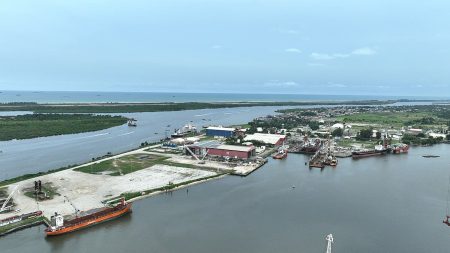23 July 2015, Lagos Recently, Dryad, a maritime risk and intelligence gathering agency in the United Kingdom, published its second quarter report on maritime crime figures. As with previous reports, Nigeria stood out in the Gulf of Guinea with the highest number of confirmed pirate attacks.

While piracy seems to be on the decrease in the South Western part of the country, as in the previous quarter, most reported incidents of piracy and kidnap recorded took place in the Brass region in the South-South, regarded as the hotbed of piracy.
The region, which includes areas from Bayelsa to Calabar, is said to be no go areas not just for fish trawlers but also oil vessels due to the level of insecurity in the waters.
However, there was a slight decrease of piracy incidents recorded in Nigeria for the second quarter compared with reported incidents for the same quarter last year.
Overall, there were 16 confirmed incidents reported during the second quarter of 2015, a slight increase over the 15 confirmed incidents reported during the same period last year.
Between April and May 2015, at least 20 mariners were reportedly taken from five vessels off the shores of Rivers and Akwa Ibom states.
The Dryad’s Chief Operating Officer, Ian Millen, said, “There have been no incidents of cargo theft in West Africa since MT Mariam was hijacked off the coast of Warri on January 11. This form of piracy in the region has reduced in frequency since two tankers were hijacked in June and July of 2014 off the coasts of Ghana and Togo.
Compared with the results of the first quarter of the year, a slight decrease in piracy incidents was observed in the second quarter of 2015. There were 18 confirmed incidents were reported during the first quarter of 2015 compared with 22 incidents for the same quarter last year.
Surprisingly, Bayelsa State, an area notorious for piracy activities, recorded just one attack offshore this year, with none occurring during the last quarter.
Millen described kidnapping of crew for ransom as the most significant threat to mariners in the Gulf of Guinea.
He said, “In March 2015, eight crew members were taken in three separate incidents off the shores of Rivers and Akwa Ibom states in Nigeria. Three mariners have since been released from captivity after being taken from MT Kalamos on March 3, 2015. Unfortunately, a crew member died by gunfire during the incident.
“Another five crew members were kidnapped in attacks on vessel MV Maridive 603 and floating storage tanker MT Yoho.”
In late January, a Nigerian naval rating was shot and killed during an attempt by pirates to seize MV Jascon 24 and take the crew for ransom. The attack occurred in the Brass region. The threat of kidnap in both regions of Bayelsa and Akwa Ibom’s offshore waters is said to be present, and further attacks are likely.
The Chief Executive Officer, Morbod Group and former President of the Nigeria Trawler Owners Association, Mrs. Magaret Onyema-Orakwusi, said although piracy was not peculiar to any part of the country, it had always been prevalent in the South-South region.
She said, ‘There are several reasons for this; one is because the South-South region is mostly the route to international waters where fishing expeditions take place.
“Secondly, this is the same region where the problem of militancy began years ago. Presently, it has become difficult to have a clear cut demarcation between the militancy and piracy. However, other regional areas are being attacked; the only difference is that the attacks have probably reduced a little bit.”
Despite reported success by the Nigerian Navy in apprehending pirates and foiling their attacks on vessels, Onyema-Orakwusi said the security of Nigerian waters was yet to improve.
She said only when vessels were able to ply the waters without being attacked would she say the situation had changed.
She said, “I don’t think the situation has improved because not everyone reports a pirate attack. It depends on who is reporting the incident or wants to report it and who is tired of reporting it. The fact that one does not get reports this week does not mean that attacks have not gone on this week.
“I can only say the situation has improved when companies that have left the country because of these attacks come back. We want to see an effective rebuttal of all their plans. We want to also see that security is on the increase just to give comfort to the operators and to put fear in the minds of the criminals.”
Onyema-Orakwusi said operators in the maritime domain could only have confidence to send their vessels out to sea when they were sure that their equipment and employees would be safe.
The Secretary General of the Nigerian Shipowners Association, Mr. Tunji Brown, noted that the frequency of pirate attacks on the vessels of its members was not as high as it was in the past.
He said, “I believe the Nigerian Navy has reduced the level of pirate attacks to the barest minimum. The navy has been very active now concerning that; that is our observation. It was reported recently that some pirates were caught in Bayelsa State; so, we are not getting these attacks on our vessels like before.
As for the prevalence of piracy in the South-South, you know the pirates mostly stay in the creek. The truth is that due to the surveillance of the Nigerian Navy, the pirates are being restricted to that part of the country and are unable to move around the Atlantic Ocean or down to Lagos unlike in the past.”
Comfort Oseghale, Punch



